ICEPAM 2025 Showcases Future Of 3D Manufacturing
Share

The SRM Institute of Science and Technology (SRMIST) hosted the International Conference on 3D Printing & Additive Manufacturing Technologies (ICEPAM 2025) in its Kattankulathur campus in the Chengalpattu District, Tamil Nadu. The Department of Mechanical Engineering hosted the international conference with the support of the Additive Manufacturing Society of India as a two-day conference in an effort to become a meeting ground for global intellect working towards innovation in the field of 3D printing and additive manufacturing technologies.
Setting the tone for the evening, renowned scientist and chief guest Dr. Vijay Kumar Saraswat, Chancellor, Jawaharlal Nehru University (JNU) and member, NITI Aayog, presented a strong opening address. Speaking of the widespread revolution additive manufacturing is to bring across industries, he said, “Additive manufacturing has transformative potential across industries from healthcare and aerospace to automotive and consumer goods. It is going to change the way we design, make, and innovate.”
Dr. Saraswat focused on India’s need to be self-reliant in making indigenously empowered technology, especially high-end manufacturing. He invited young scientists, engineers, and entrepreneurs to adopt digital fabrication technologies and become part of India’s increasing self-reliance in advanced industrial capacity. The future of innovation, according to him, lies in exploiting digital design, rapid prototyping, and mass customization all enabled through additive manufacturing.
The event is scheduled for July 11 and 12 and boasts a strong program of sessions, exhibition, and live demonstrations. The attendees include a wide base of international and national experts, academicians, research scholars, and industry leaders. ICEPAM 2025 is designed to offer an international platform for the exchange of knowledge, presentation of cutting-edge research, and cooperation in applied practices of 3D printing technologies.
Addressing the assembly, SRMIST Vice Chancellor Prof. C. Muthamizhchelvan summoned students and young entrepreneurs to break limitations and venture into learning beyond classrooms. “Students must develop new knowledge through extending and transforming beyond classrooms. Technology should assist not only the privileged few but also our nation’s enormous rural majority,” he averred, reaffirming the institute’s vision for inclusive innovation and affordable education.
ICEPAM 2025 boasts several thematic sessions on the most recent developments in materials science, printer designs, simulation technologies, bioprinting, additive manufacturing sustainability, and industrial applications in industry 4.0. Research labs and industry partners are presenting live demonstrations, giving attendees the opportunity to see for themselves the innovative tools and techniques that are redefining manufacturing’s future.
The conference has also seen a string of industry players and startups who are capitalizing on this platform to bring new products, prototypes, and services into the realm of 3D printing. Startups in medical implants, dental implants, aerospace parts, customized tooling, and even food printing are some of the ones who have graced the conference. This focusing under one platform of both industry and academia is an important step towards bridging the gap between theoretical research and implementation.
ICEPAM 2025 has been greatly appreciated for its emphasis on current trends and on the promotion of collective work among schools, research institutes, and the business community. Concentrating on skill development, innovation, and entrepreneurship, the conference will seek to motivate the future generation of technologists and engineers.
The conference also symbolizes the increasing reputation of SRMIST as a leading institution in the learning and research of science and technology. With an initiative like ICEPAM, academic excellence, contact with industry, and innovation by students are also valued by SRMIST. The institution is also characterized by focus on building research to address India’s developmental challenges and industrial requirements.
Since the conference is to be conducted over two days, it has potential to generate conversation in terms of regulatory environments, design ethics, and sustainability of additive manufacturing, particularly in a world that is quickly digitizing. The attendees would like to learn about how 3D printing technologies can assist in achieving cost reduction, environmental sustainability, and customization of the manufacturing process across industries.
ICEPAM 2025 wraps up on July 12, with a valedictory function of awarding research papers, techno-session spotlights, and future roadmap for the stakeholders to collaborate. ICEPAM 2025 will leave an enduring legacy on its participants, providing them with insight and inputs that will drive their own contribution to India’s manufacturing sector in the years to come.






